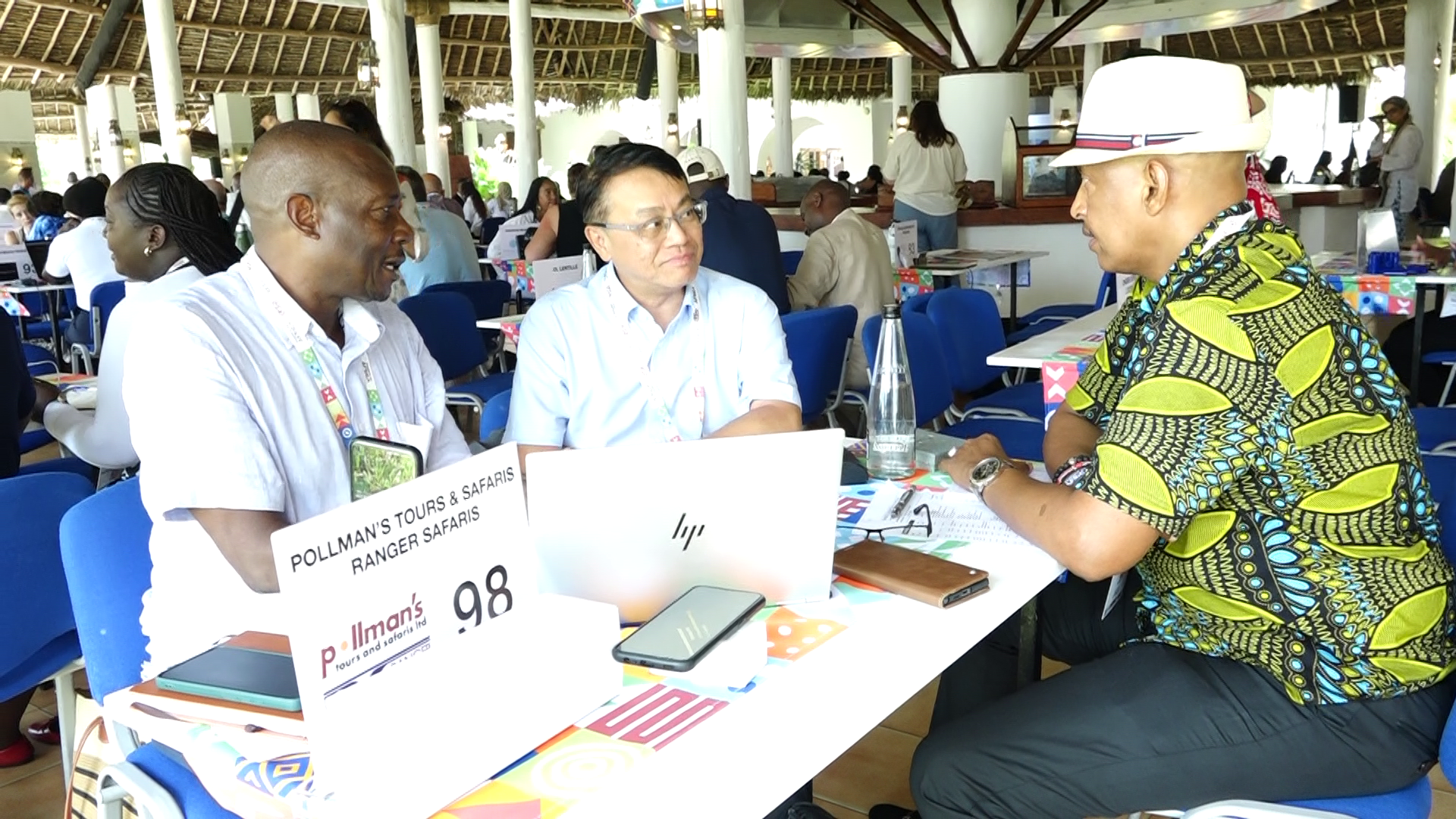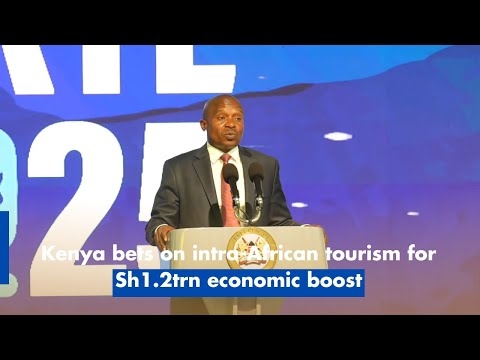
 Pollmans Tours and Safaris director Mohamed Hersi (right) with international tourism agents during the Essence
of Africa 2025 conference at Diamonds Malindi /HANDOUT
Pollmans Tours and Safaris director Mohamed Hersi (right) with international tourism agents during the Essence
of Africa 2025 conference at Diamonds Malindi /HANDOUTTourism stakeholders from across Africa have been urged to
embrace new global travel trends and repackage their offerings to meet the
expectations of modern travellers, particularly the younger generation.
The call was made during the opening of the Essence of Africa 2025 three-day tourism forum at Diamonds Malindi, Kilifi County.
The event brought together 150 pre-qualified international buyers and 150 African exhibitors from over 40 countries to connect and explore emerging opportunities in the continent’s tourism market.
Stakeholders at the forum emphasised the need for the continent’s tourism industry to tailor its products based on the demographics and geographic backgrounds of travellers.
The discussions underscored that tourism is no longer a one-size-fits-all experience, but rather a lifestyle-driven journey where authenticity, flexibility and technology play a central role.
One of the key highlights was the evolving behaviour of Gen Z travellers, young professionals who work virtually and prefer longer stays.
Unlike older generations who used to plan trips years in advance, Gen Z tourists tend to make spontaneous travel decisions, choosing destinations within a few months and often extending their stays as they work remotely.
Paula Newton from Rethink Travel Marketing, based in Los Angeles, said African tourism operators must adjust to this trend if they wish to remain competitive.
“I feel that forward bookings are much closer with this generation. They’re not booking two or three years out. They decide within three to five months, and they share their experiences instantly on Instagram and WhatsApp,” she said.
“This generation becomes your marketing team; they advertise your products by sharing their experiences online.”
Newton added that younger travellers are more interested in immersive and authentic cultural experiences rather than luxury resort stays.
“They want to feel that they are really in Africa. Suppliers must look at this younger market not as budget travellers but as long-stay, high-value explorers,” she said.
Andrea Landaeta of Sariri Terra in Brazil, described Latin American region as an “untapped goldmine” for African tourism.
Landaeta said many travellers from her region still have misconceptions about Africa, often seeing it as a single country.
“Mexicans often want to ‘do all of Africa in two weeks’, from the Maasai Mara to Cape Town via gorilla trekking and Victoria Falls,” she said.
However, she added that perceptions are changing.
“Africa has now moved to the top of Brazilian travel wish lists. They’re expanding beyond South Africa, exploring Botswana, Mozambique, even Uganda gorilla trekking,” she said.
“They are seeking ‘luxury with purpose’, experiences that are high-end but also make a meaningful impact.”
From Asia, Lin Yu of Travel World China said to attract Chinese travellers, African tourism players must localise their marketing and adapt to Chinese digital platforms.
“If you’re not on WeChat, you’re not talking to China,” she said.
“It’s not just a messaging app, it’s the main platform for communication, content and commerce. When suppliers send materials through Dropbox or SharePoint, we can’t even open them in China.”
Yu emphasised that marketing content targeting the Chinese market must be in Mandarin and formatted for WeChat.
“Auto-translation tools are about 85 per cent accurate, but visuals work best. AI can assist, but you still need someone managing content consistently,” she said.
Post Covid-19 pandemic, Yu explained, Chinese travellers have become more sophisticated, moving away from checklist tourism toward authentic, experience-driven travel.
“They’re willing to pay more for meaningful, well-organised experiences. There’s also rising demand for luxury family travel, so properties must cater to both groups and high-end families,” she noted.
Essence of Africa co-founder Jacqui Reynolds highlighted sustainability as one of the strongest selling points for African destinations.
“African tourism stakeholders are increasingly focusing on sustainable, eco-friendly and responsible tourism because that’s what their international audience is demanding,” she said.
“In some markets, over 70 per cent of travellers are actively seeking sustainable tourism experiences. East Africa, in particular, must position itself as a leader in this space.”
She said sustainability is no longer optional; it is a key driver of competitiveness and brand value in the global tourism market.
Kgomotso Ramothe, chief executive officer of Memberships at the African Travel and Tourism Association, said the forum is a critical platform that connects African tourism suppliers with international buyers and wholesalers.
“We’re making sure the buyers have access to a diverse range of products, from boutique lodges to community-based experiences,” she said.
“When you visit a place in Africa, it’s not just about sitting on a beach. The beauty of Africa is in its people, its culture and its stories, things you can only experience on the ground.”
Ramothe also called on African governments to invest more in developing and nurturing local tourism talent.
“We need people who can showcase Africa in a positive and authentic way,” she said.
Locally, the event is expected to make a significant economic impact on Malindi.
According to Kate Mwikali, chairperson of the Progress Welfare Association of Malindi, the conference will inject about Sh55 million into the local economy.
“With more than 300 participants in Malindi, not counting the multiplier effect from local traders, artisans, transport providers and cultural tourism, this event will leave a major impact on the community,” she said.
Mwikali said each business traveller spends an average of Sh110,000 per trip, meaning the direct and indirect benefits to Malindi will be substantial.
This is the second time Kenya is hosting Essence of Africa after last year’s successful edition in Nairobi.
INSTANT ANALYSIS
The Essence of Africa 2025 forum in Malindi underscored a shifting global tourism landscape, urging African destinations to adapt to new traveller behaviours driven by technology, sustainability and authenticity. Experts highlighted the rise of Gen Z travellers who value immersive experiences over traditional luxury and the growing influence of emerging markets such as China and Latin America.















![[PHOTOS] Ole Ntutu’s son weds in stylish red-themed wedding](/_next/image?url=https%3A%2F%2Fcdn.radioafrica.digital%2Fimage%2F2025%2F11%2Ff0a5154e-67fd-4594-9d5d-6196bf96ed79.jpeg&w=3840&q=100)
